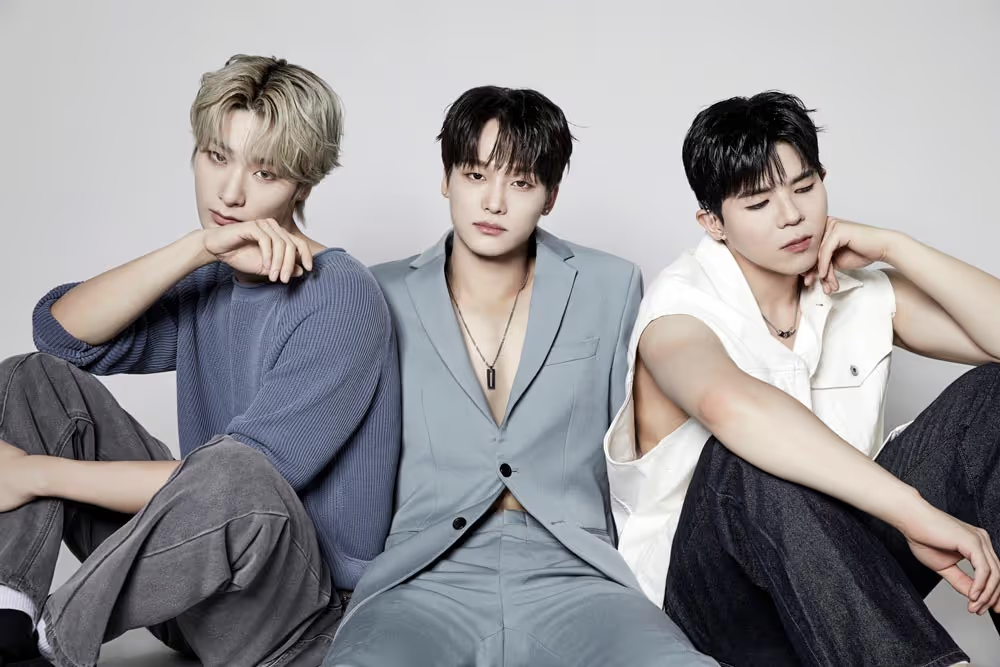
Backstage, Park Hyunjin adjusted the vibrating watch on his wrist. Beyond the curtain, the crowd roared, their energy shaking the floor. For him, the vibrations spoke louder than the noise. He glanced at his bandmates, nodded, and stepped into history.
On April 20, 2024 — Korea’s Day of Persons with Disabilities — Big Ocean debuted with their single “Glow.” With their debut, Big Ocean wasn’t stepping into K-pop as just another idol group. They became the world’s first D/deaf and Hard-of-Hearing (DHH) boy band, bringing accessibility to the center of one of the world’s most competitive music industries.
For Hyunjin, Jiseok, and Chanyeon, that night marked more than a performance. It was the beginning of a new conversation about who gets to belong in music.
Each member of Big Ocean carries a personal story of hearing loss, resilience, and creativity. Together, those stories ripple outward — reshaping what it means to be an artist in K-pop.
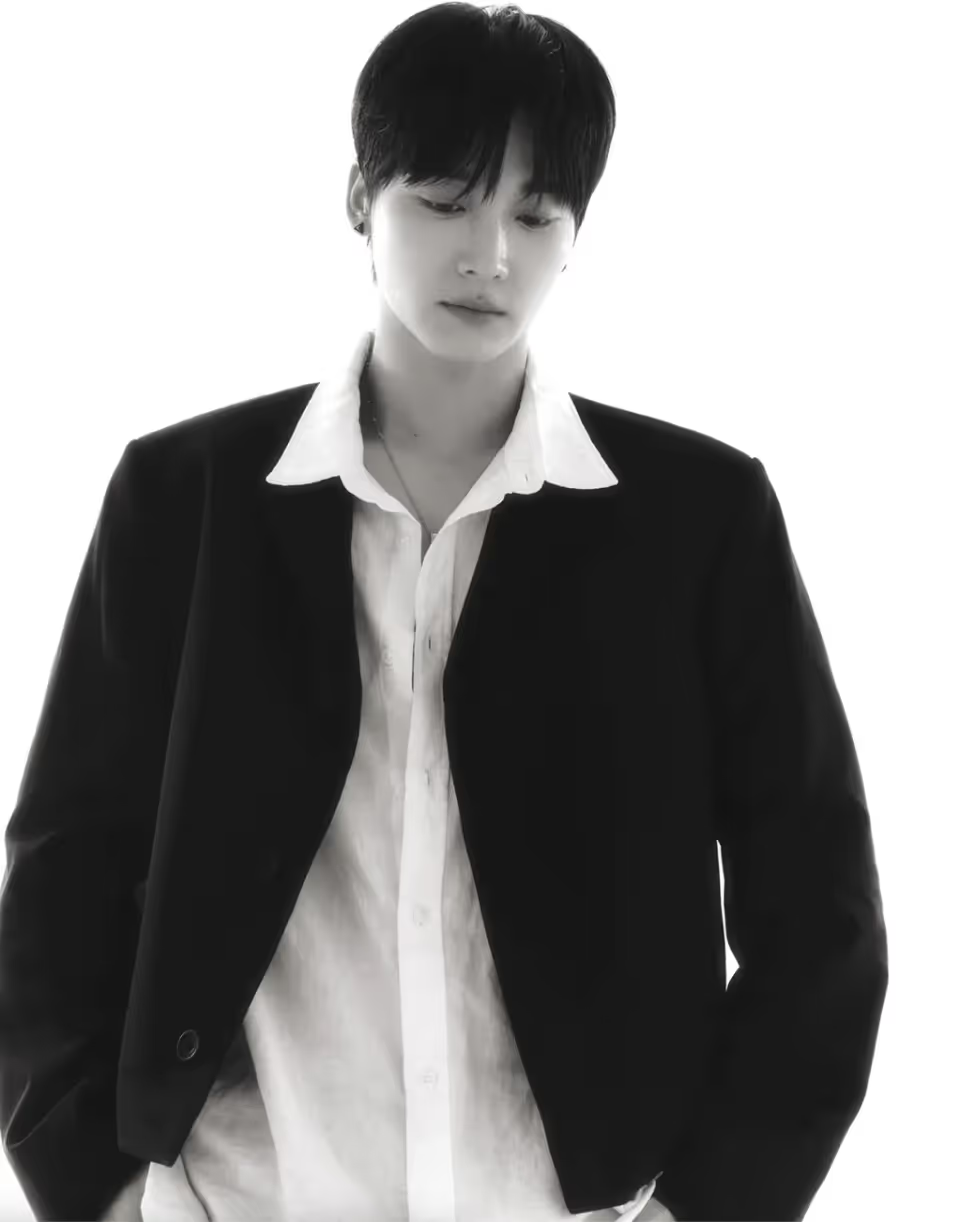
Hyunjin lost his hearing at age three after a sudden fever — something his family only discovered a year later. He wore two hearing aids through childhood, and at nine, he received a cochlear implant in his left ear while continuing to use a hearing aid in his right.
Before stepping into music, he studied Computer Engineering and even considered a career in cybersecurity. At the same time, he built a following on YouTube, where he spoke openly about hearing loss and the stigma surrounding it. Those early experiences shaped him into both an advocate and a leader.
“Music doesn’t disappear when you lose hearing,” he says. “You just experience it differently.”
Today, Hyunjin leads Big Ocean with quiet strength — keeping time through a vibrating smartwatch, feeling rhythm in the floor beneath him, and anchoring every performance with both confidence and compassion.
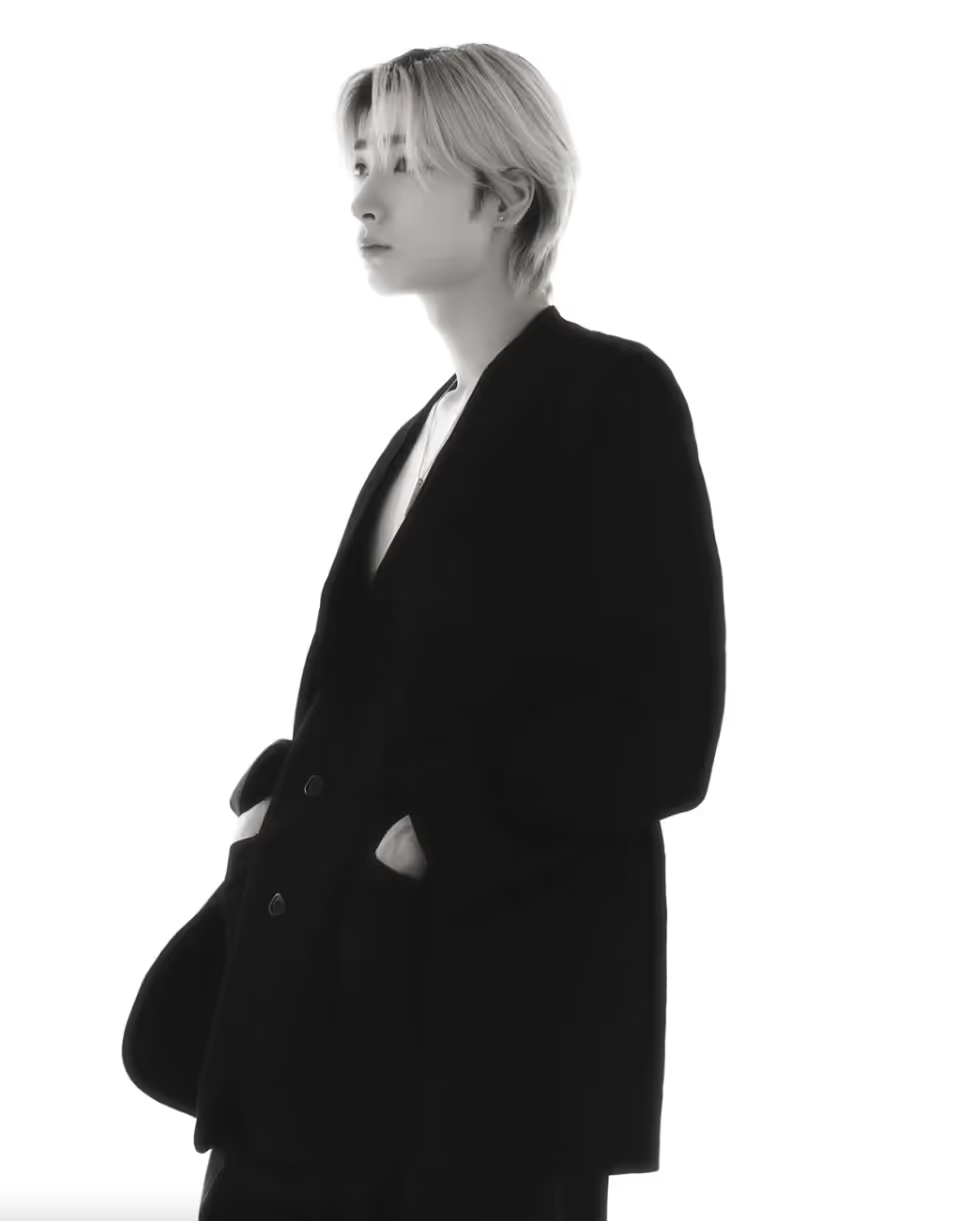
Jiseok was born with profound hearing loss. For him, rhythm was never something he heard — it was something he felt through movement. As a child, he trained in alpine skiing and taekwondo, eventually competing with the Seoul Para Ski Team. Sports gave him discipline, balance, and confidence, qualities that now shape his artistry.
After high school, he applied to six universities. With no accommodations in the interview process, he struggled to follow questions and often stayed silent. He was rejected everywhere. It was a discouraging moment, but also a turning point. That search for belonging eventually led him to his agency, and to music.
“In sports, I learned discipline. In failure, I found direction,” he reflects.
Today, Jiseok performs with the same focus he once brought to competition. He reads rhythm in flashing lights, feels tempo in vibrations, and moves in flawless sync with his bandmates. His story proves that rhythm doesn’t only live in sound — it can be embodied, shared, and brought to life on stage.
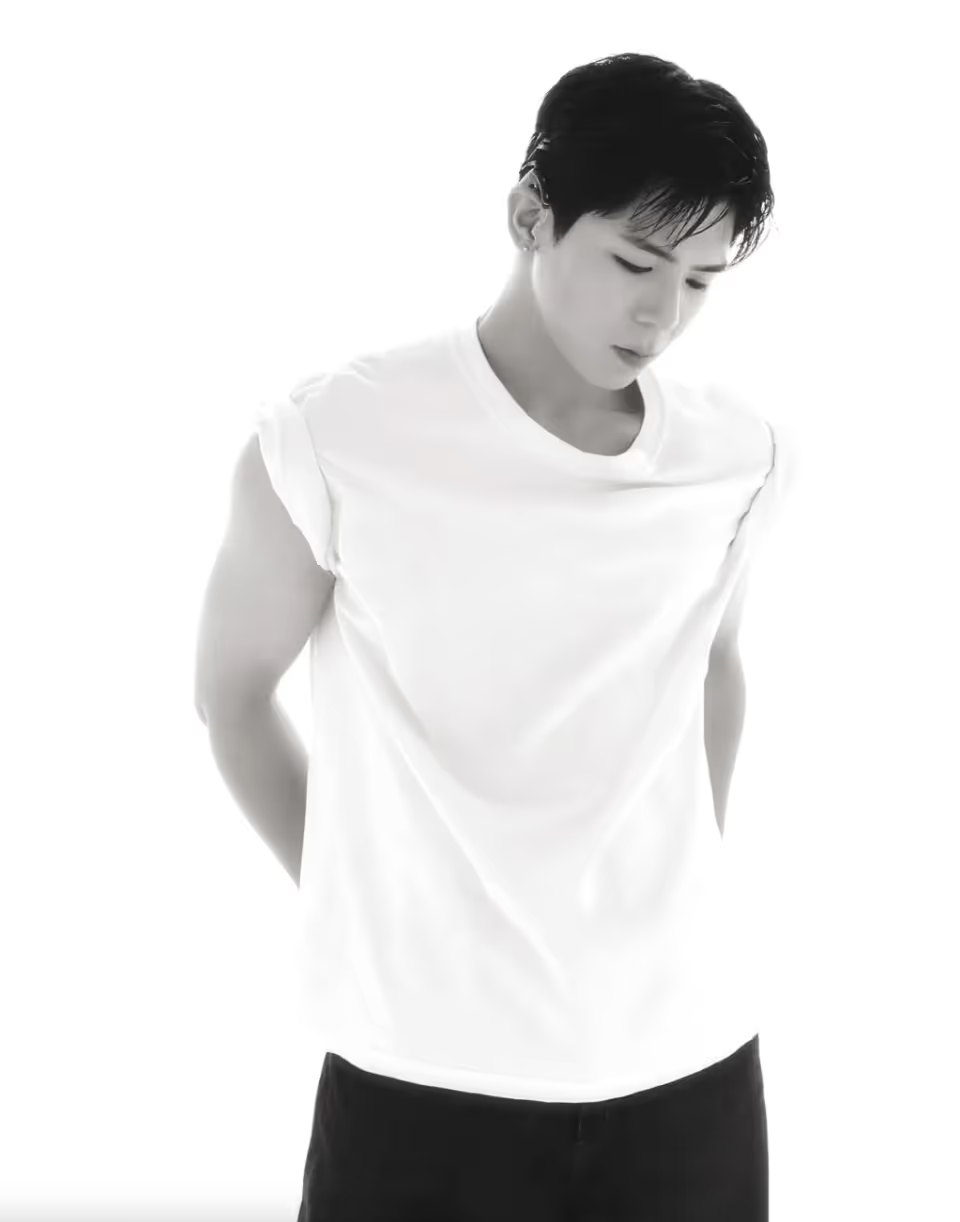
Chanyeon began losing his hearing at age eleven and chose a path of service. He studied audiology and worked at Korea University Anam Hospital, helping patients adapt to the same devices he used himself. For a time, it seemed certain he would spend his career behind a desk in a white coat.
But music called him back in an unexpected way. At the hospital, he met Troy Kotsur, the Academy Award–winning Deaf actor appointed as an ambassador, and Kim Lihoo, a respected figure in Korea’s disability community. Those encounters opened a new door, connecting him to Parastar Entertainment — the agency that would launch Big Ocean.
“In the clinic, I gave people tools to hear,” he says. “On stage, I can give them something to feel.”
Now, Chanyeon is Big Ocean’s innovator, blending science and art. He helps integrate tools like AI pitch visualizers and flashing metronomes into rehearsals, ensuring the group stays in sync. Once an audiologist, he now commands the stage, greeted by audiences raising their hands in sign language back at him.
Step into Big Ocean’s practice room.
Inside Big Ocean’s practice room, silence is not absence — it’s part of the structure.
Flashing metronomes take the place of click tracks. Vibrating watches send cues through the wrist. A nod, a glance, even a breath is enough to keep the beat.
For vocals, AI pitch visualizers transform sound into sight. A flat note appears jagged on the screen; a steady note smooths into symmetry. The software doesn’t replace their voices, it helps refine them.
Sign language choreography weaves through every song. Korean Sign Language, ASL, and International Sign aren’t additions, but essentials — turning lyrics into movement and performance into conversation.
Rehearsals pulse with light and vibration. Every gesture carries weight, guiding the group as naturally as a shouted count might for others.
In an industry built on precision and uniformity, Big Ocean is breaking new ground. They haven’t simply adapted K-pop to their needs — they’ve expanded it, creating performances that show how accessible music can be powerful, dynamic, and whole.
At their debut, D/deaf and Hard-of-Hearing fans signed along to “Glow.” Hearing fans mirrored their movements. The arena became a dialogue of hands and voices — something rarely seen in K-pop until that moment.
Their fandom, PADO (the Korean word for “wave”), has embraced accessibility as culture. Online, fans share tutorials breaking down choreography and teaching the signs woven into Big Ocean’s music. For the first time, sign language itself is trending in K-pop spaces.
The media has taken notice. The Guardian praised their mini-album Underwater as “a multisensory dive into identity.” Yet the most powerful recognition comes from fans. One wrote: “I’ve loved K-pop for years, but this is the first time I’ve seen myself on stage. Big Ocean isn’t just performing for us — they’re performing with us.”
At international showcases, audiences from Brazil to Japan have signed along in their own languages. Big Ocean’s concerts have become more than performances. They are celebrations of accessibility, identity, and belonging.
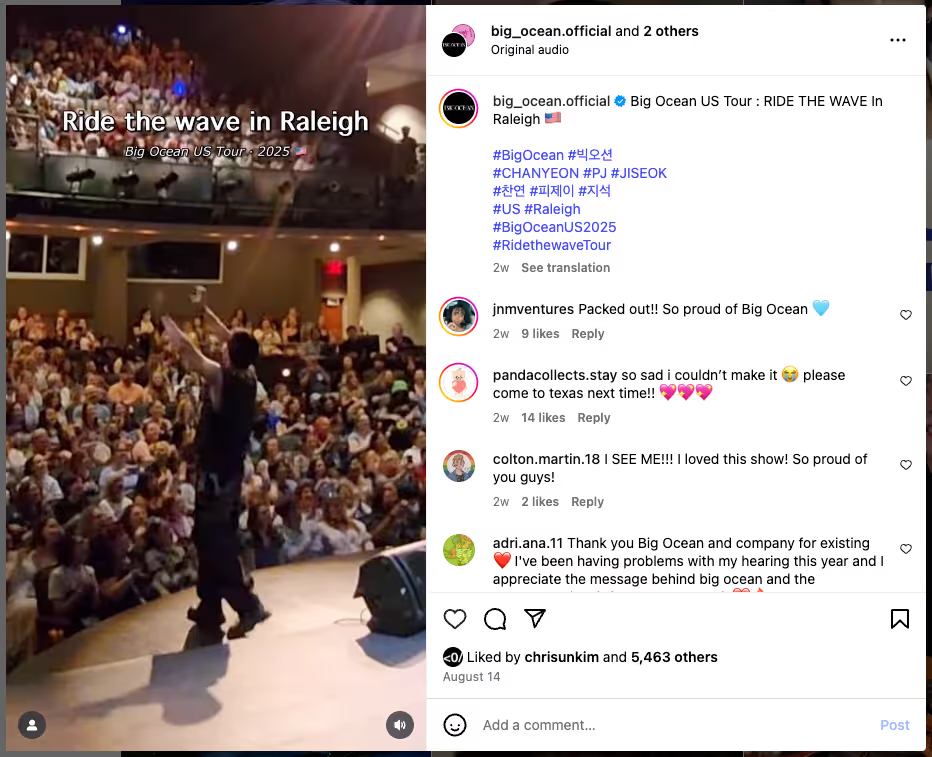
Big Ocean is still early in their career, but their message is already clear: music is not only heard — it is felt, seen, and shared.
They are not defined by hearing loss, but by how they have transformed it into artistry. Through vibration, light, and sign, they show that accessibility doesn’t limit creativity — it multiplies it. And in their wave, millions are finding representation, possibility, and joy.
When asked what kind of singers they hope to become, each member answered with conviction:
Their vision is bold. Their presence is undeniable. Big Ocean is not only entertaining — they are reshaping who music belongs to. And as their story unfolds, one truth echoes from every stage: when accessibility leads, music becomes more powerful, more inclusive, and more human.
At InnoCaption, we believe accessibility fuels connection — the same truth Big Ocean carries with every beat, sign, and step. When music is made open to everyone, it becomes more than sound. It becomes a shared human experience.
InnoCaption provides real-time captioning technology making phone calls easy and accessible for the deaf and hard of hearing community. Offered at no cost to individuals with hearing loss because we are certified by the FCC. InnoCaption is the only mobile app that offers real-time captioning of phone calls through live stenographers and automated speech recognition software. The choice is yours.